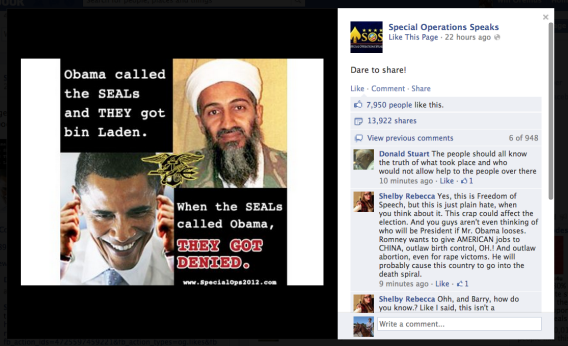Allegations of liberal media bias are old hat. Facebook just handed the right wing a new rallying cry: social-media bias!
Last weekend, Facebook this week reportedly took down a wildly popular piece of political propaganda posted by Special Operations Speaks (SOS), a group of anti-Obama Special Ops types and fellow travelers. In both a warning and a subsequent takedown notice, the company informed the administrator of SOS’s Facebook page that the image violated its statement of rights and responsibilities. When he reposted it, Facebook not only took it down but froze SOS’s account for 24 hours, preventing him from posting anything else.
The image has gone viral each time SOS has (re-)posted it. Its message is partisan, simplistic, and arguably misleading—but that’s true of most political memes. And sure, some might see a vicious edge in the pairing of Obama’s visage with that of bin Laden. But this sort of swiftboating ought to be rebutted with reason, not squelched with censorship. As the Washington Post’s Erik Wemple writes on his blog:
(The meme) might draw a snicker or two from journalism’s fact-checking police. After all, the Fox News report alleged that the CIA “chain of command” had denied military assistance for U.S. personnel in Benghazi, not Obama himself. Whatever—the meme was miles inside the bounds of acceptable political expression, not to mention Facebook’s own standards.
Only yesterday, after the conservative website Breitbart.com had picked up the story and helped to spread it across the right-wing Web, did Facebook publicly acknowledge that it was in the wrong. The company’s Andrew Noyes told Breitbart, “I assure you that removing the image was not an act of censorship on our part. This was an error and we apologize for any inconvenience it may have caused.”
It’s good that the company backtracked. Not because this particular meme deserves to live on, but because private companies like Facebook have become a critical part of the 21st-century public square. And if the public can’t count on them to be evenhanded in their treatment of political speech, that’s a serious problem.
But Noyes’ claim that this “was not an act of censorship” invited the question: What, exactly, was it an act of? It wasn’t a simple technical glitch: The page’s owner provided the Post’s Wemple with a message he received from Facebook acknowledging that “a member of our team accidentally removed something you posted on Facebook.” But the notion that an employee could “accidentally” issue a warning, remove a post, remove it again, and freeze a user’s account is implausible. And Facebook’s apparent obfuscation fueled conspiracy theories from the likes of comedian Dennis Miller, who tried absurdly to pin the censorship on Obama.
I emailed the company today for further clarification, and Noyes responded with the following statement:
This was an error and we apologize for any inconvenience it may have caused. Our dedicated User Operations Team reviews millions of pieces of content a day and our policies are enforced by a team of reviewers in several offices across the globe. This team looks at hundreds of thousands of reports every week, and as you might expect, occasionally, we make a mistake and block a piece of content we shouldn’t have.
That sounds more like it. It seems quite possible that this was an act of censorship by an employee overzealously applying the company’s policies to a post he or she found objectionable. Such incidents are probably inevitable given the scale of the company’s operations, and I’m sure this has happened to some left-wing political posts over the years as well as right-wing ones.
In the end, the episode mainly just highlights how tricky it is for a company to regulate speech. If only the company’s representiatives had put it this clearly from the start, Breitbart and Miller and co. might still be out there hawking conspiracy theories, but they would have been a lot easier to debunk.
